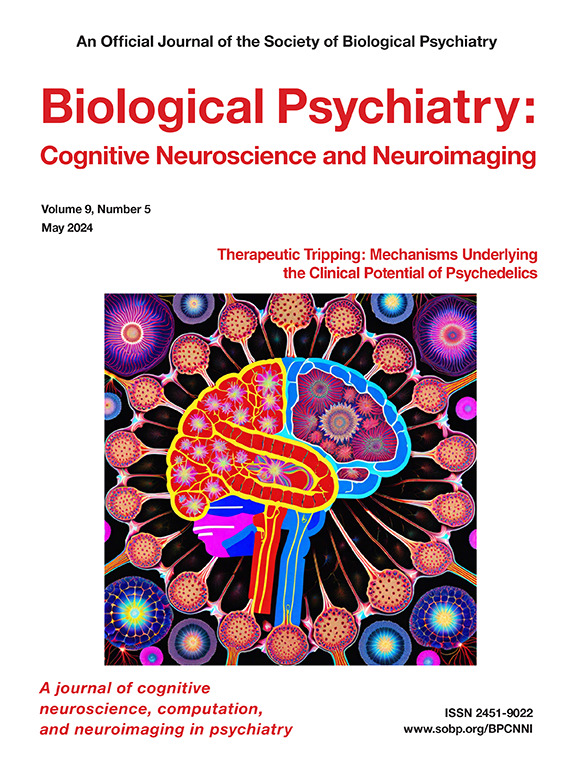深度学习衍生出的跨诊断特征,索引了过度焦虑和冲动控制:精神病治疗预测的意义》。
IF 4.8
2区 医学
Q1 NEUROSCIENCES
Biological Psychiatry-Cognitive Neuroscience and Neuroimaging
Pub Date : 2025-06-01
DOI:10.1016/j.bpsc.2024.07.027
引用次数: 0
摘要
背景:传统上,精神病是按照诊断类别进行分类的,但这种方法有其局限性。研究领域标准(RDoC)是基于领域内的各个维度对精神疾病进行研究分类的系统,这些维度贯穿这些精神疾病的诊断。RDoC 的总体目标是通过基本神经生物学和行为学系统的功能障碍来更好地理解精神疾病,从而更好地进行诊断、预防和治疗:作为唤醒/调节系统 RDoC 领域的一部分,我们研究了一种独特的脑电图(EEG)特征,即纺锤形过度β(SEB),它与冲动控制和睡眠有关。在这里,我们将脑电图额叶贝塔活动作为一种潜在的跨诊断生物标志物进行研究,这种标志物能够诊断和预测冲动控制和睡眠问题:结果:我们在第一个数据集(n=3279)中发现,通过深度学习算法分类的 SEB 概率与睡眠维持不良和日间冲动控制能力低有关。此外,在另外两个独立的数据集(iSPOT-A,n=336;iSPOT-D,n=1008)中,我们发现传统的前中心β功率和/或SEB概率(被称为Brainmarker-III)与注意力缺陷多动障碍(ADHD)的诊断有关,与ADHD儿童服用哌醋甲酯的缓解有关,与重度抑郁症成人服用抗抑郁药物的缓解有关,与药物的特异性有关:我们的研究结果证明了 RDoC 方法在精神病学研究中的价值,它有助于发现具有诊断和治疗预测能力的生物标志物。本文章由计算机程序翻译,如有差异,请以英文原文为准。
A Deep Learning–Derived Transdiagnostic Signature Indexing Hypoarousal and Impulse Control: Implications for Treatment Prediction in Psychiatric Disorders
Background
Psychiatric disorders are traditionally classified within diagnostic categories, but this approach has limitations. The Research Domain Criteria (RDoC) constitute a research classification system for psychiatric disorders based on dimensions within domains that cut across these psychiatric diagnoses. The overall aim of RDoC is to better understand mental illness in terms of dysfunction in fundamental neurobiological and behavioral systems, leading to better diagnosis, prevention, and treatment.
Methods
A unique electroencephalographic feature, referred to as spindling excessive beta, has been studied in relation to impulse control and sleep as part of the arousal/regulatory system RDoC domain. Here, we studied electroencephalographic frontal beta activity as a potential transdiagnostic biomarker capable of diagnosing and predicting impulse control and sleep problems.
Results
We showed in the first dataset (n = 3279) that the probability of having spindling excessive beta, classified by a deep learning algorithm, was associated with poor sleep maintenance and low daytime impulse control. Furthermore, in 2 additional, independent datasets (iSPOT-A [International Study to Predict Optimized Treatment in ADHD], n = 336; iSPOT-D [International Study to Predict Optimized Treatment in Depression], n = 1008), we revealed that conventional frontocentral beta power and/or spindling excessive beta probability, referred to as Brainmarker-III, is associated with a diagnosis of attention-deficit/hyperactivity disorder, with remission to methylphenidate in children with attention-deficit/hyperactivity disorder in a sex-specific manner, and with remission to antidepressant medication in adults with major depressive disorder in a drug-specific manner.
Conclusion
Our results demonstrate the value of the RDoC approach in psychiatry research for the discovery of biomarkers with diagnostic and treatment prediction capacities.
求助全文
通过发布文献求助,成功后即可免费获取论文全文。
去求助
来源期刊

Biological Psychiatry-Cognitive Neuroscience and Neuroimaging
Neuroscience-Biological Psychiatry
CiteScore
10.40
自引率
1.70%
发文量
247
审稿时长
30 days
期刊介绍:
Biological Psychiatry: Cognitive Neuroscience and Neuroimaging is an official journal of the Society for Biological Psychiatry, whose purpose is to promote excellence in scientific research and education in fields that investigate the nature, causes, mechanisms, and treatments of disorders of thought, emotion, or behavior. In accord with this mission, this peer-reviewed, rapid-publication, international journal focuses on studies using the tools and constructs of cognitive neuroscience, including the full range of non-invasive neuroimaging and human extra- and intracranial physiological recording methodologies. It publishes both basic and clinical studies, including those that incorporate genetic data, pharmacological challenges, and computational modeling approaches. The journal publishes novel results of original research which represent an important new lead or significant impact on the field. Reviews and commentaries that focus on topics of current research and interest are also encouraged.
 求助内容:
求助内容: 应助结果提醒方式:
应助结果提醒方式:


